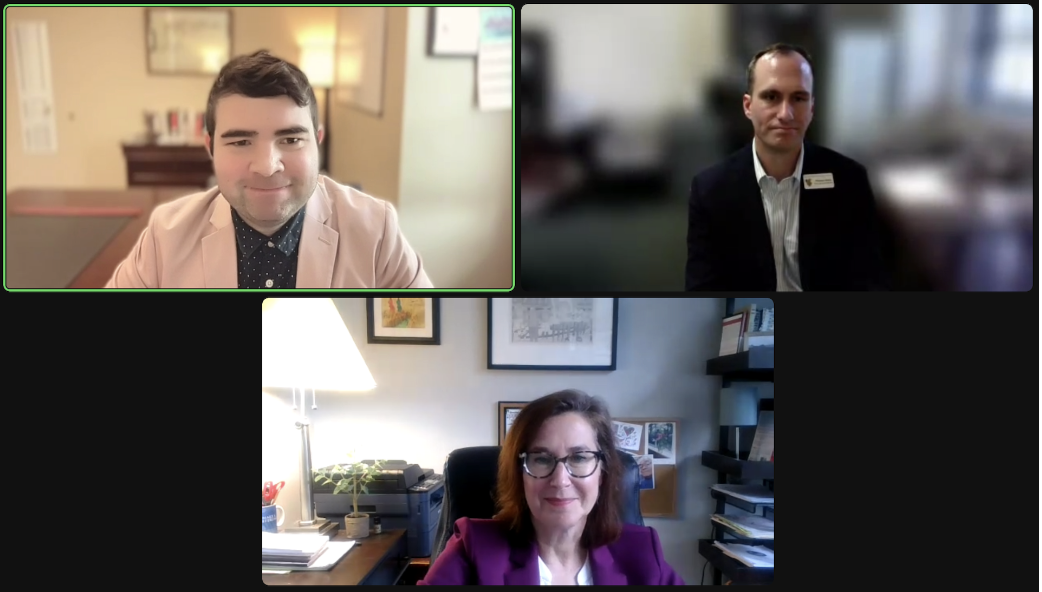Applied Democracy Exchanges: Reviving Public Responsibility in Legal Systems
For the fifth session of Applied Democracy Exchanges, the Mathews Center invited Carla Crowder, Executive Director of the Alabama Appleseed Center for Law & Justice, and Thomas Rains, Executive Director of the Judge Frank M. Johnson, Jr. Institute, to share about the work they are doing in their communities and the people of Alabama to promote the connection between the justice system and citizens’ trust in the institution.
On Thursday, May 18th, participants met online to discuss the perils of democracy in Alabama. With the continued shift in democratic practices and increasing polarization of opinions, public trust in institutions, both governmental and nongovernmental, has declined in recent years. May’s session, “Trust & Justice: Reviving the Public Responsibility to Maintain Legitimate Legal Systems,” highlights the inventiveness and direct representation of these organizations to reinstate confidence in our democracy.
Named after the District Court Judge for the Middle District of Alabama, the Judge Frank M. Johnson, Jr. Institute hopes to continue carrying on the legacy of the Judge and his formative court decisions through their civic education programming. Originally from Winston County, Alabama, an area that attempted to secede from the Confederacy during the Civil War, Judge Johnson was appointed to the Middle District in Montgomery in 1955 by President Eisenhower. Shortly after his appointment, he was faced with a case that would be fundamental to the future of civil rights in Alabama: Browder v. Gayle, which challenged the constitutionality of city bus segregation in the state. As part of a three-judge panel, the court legally ended segregation on public transportation, applying the precedent set by Brown v. Board for the first time outside of public education. Judge Johnson continued to make rulings that supported the civil and human rights of the people of Alabama throughout his judgeship, and it is these cases that the Institute utilizes today to teach students about the Constitution and democracy.
While the Institute has many areas of work, their main programming focuses on the civic education of the state, with hopes to expand programming beyond Alabama. During visits to the Judge Frank M. Johnson, Jr. Courthouse in Montgomery, a site in the U.S. Civil Rights Trail, students and educators walk through mock trials, speaking one-on-one with volunteer attorneys and judges, to immerse themselves in the Constitutional process. Not only does the Institute incorporate the court cases ruled on by Judge Johnson, but also more relevant cases and topics, such as the social media case, Elonis v. United States. This interactive environment creates a memorable experience and critical thinking process that students can continue to utilize throughout their lives as active citizens, and educators can adapt and use in the classroom.
Like the Judge Frank M. Johnson, Jr Institute, Alabama Appleseed’s staff works across a variety of areas, but one of their main goals is also to encourage the education of people of Alabama, focusing on the current legal and criminal justice institutions in place today. By conducting surveys across the state, Appleseed is able to decipher which issues are affecting Alabamians the most, giving them direction to address legislature and other institutions reinforcing the problem. A longstanding hurdle that they have often heard is fines and fees from traffic tickets, causing drivers license suspensions; however, through advocacy and legislative change, bill SB154 has passed to the Governor’s desk for signature, which would provide more leniency for fine payments and support the people of Alabama. By expressing the improvements that can be made in the state, Appleseed hopes to create a culture change in Alabama, both among the people and governmental institutions, building a system of trust.
Our next ADE session will occur on Thursday, June 15th, at 12:00PM CDT online via Zoom. We will be joined by Auburn University’s Living Democracy students, a partner of our Jean O’Connor Snyder Internship Program, who are currently spending the summers living, learning, and implementing civic engagement skills in different towns across Alabama. You can register at the ADE Eventbrite page here.


